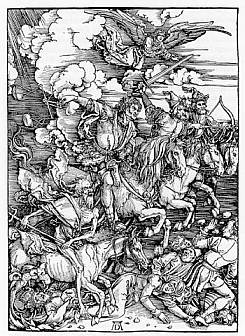 Where I live, everyone has been running around like crazy, preparing. Kids are off school. People have been buzzing about how it might all go down, and who will be chosen and who will not. Some have been anxious, others elated. What has long been awaited is finally upon us.
Where I live, everyone has been running around like crazy, preparing. Kids are off school. People have been buzzing about how it might all go down, and who will be chosen and who will not. Some have been anxious, others elated. What has long been awaited is finally upon us.
In other words, it’s the week of the county fair.
You thought perhaps I was speaking of something else?
Like that blood moon thing. Oh, that’s yesterday’s news. Who’s going to win Best of Show in cattle is more important right now.
As for me, I’m not so much a county fair person. I’m more concerned with the aftermath of this month of September within the pathetic prophetic community in charismatic and dispensationalist Christianity.
An unhealthy fascination with the Jewish holy days of Rosh Hashanah and Yom Kippur, which fall within September, is an area of concern. This year is also a Jubilee year in Judaism, which happens every 50 years (7 X 7 Shemitah years plus one) and marks a time of the forgiving of debts and the releasing of those in bondage of any kind. Add in the blood moon tetrad we just experienced, and all manner of End Times craziness afflicted us in 2015.
Over at Charisma magazine online (CharismaMag.com and it’s sister site, CharismaNews.com), it’s business as usual, save for a few rare posts wondering why nothing happened. For the last year or so, these sites have been spewing predictions about this month’s eschatological “certainties.” I know this because my Facebook pages have been strewn with Christians posting End Times articles sourced from these two websites.
What was supposed to happen as prophetically announced through various pricey books, DVDs, teaching seminars, and other big money generators was the end of the world, the Second Coming of Christ, the exposing of the Beast and Antichrist, the Last Battle, all manner of Israel-related stuff, signs in the heavens, and signs on earth.
Oh, and that Catholic leader guy visited America. Surely he had to fit into all that too. Had to. Gotta read all the signs.
Here’s the scorecard:
Blood moon tetrad events – FAIL
Wonders related to Shemitah – FAIL
Attacks on Israel – FAIL
Armageddon – FAIL
The Second Coming of Christ – FAIL
The Rapture of the Church – FAIL
Wow, that’s surprising, isn’t it? Not one of those things either happened or signaled anything.
What gets me is that we’ll go on about our business, get ready for fairs, go to work, cheer or lament our local football teams, and nowhere will there be an admission from all these “prophets” who made a fortune hocking End Times nonsense that they were ultimately dead wrong about everything they predicted. And nowhere will there be an apology from the editiorial staff at Charisma that they rode this nuttiness for all it was worth and that they’re sorry for having done so.
I fully believe that Jesus will return one day. I fully believe it will be during a time of great unrest and turmoil. I fully believe that a war between the forces of God and the forces of Satan will erupt sometime in the future.
But all these End Times predictions by self-anointed prophets in polyester suits seem more like astrology, numerology, divination, and outright witchcraft than anything Christian that proceeds from the throne of God Almighty.
God is not a god of error, confusion, and fear. He is not found in earthquakes and windstorms, but instead speaks in a still, small voice, yet one that carries devastating and lasting authority.
My advice to fellow believers is to stop funding and promoting charlatans who attempt to make money by peddling loud, scary predictions. Just stop. Please. Don’t buy their materials and don’t repeat their silliness in social media and elsewhere.
I also hope you will consider that today will be no different than yesterday, and that no apologies will come from those who spoke wrongly. Consider that sometime in the next year we will get another run-up of predictions heading into next September, and by the same “prophets,” and they will be wrong then too.
Whatever we do, we cannot and should not forget or excuse these failed prophetic words. We cannot go on as if the failure of these predictions does not matter. The only way the Church can be strengthened is if we stop supporting the predictions and predictors. One reason lost people no longer look to the Church for answers is because of this nonsense. It must be dealt with.
If any of us fell for all this, we should not lie to ourselves that we didn’t. Instead, we should get before God and get real with Him about our obsession with all things End Times and our tendency to fall for related nonsense. My fear is, if we don’t deal with it, should the Liar of All Liars arise in our lifetimes, we will believe his or her lies just as readily as we believed all these mistaken “prophets.”
I will add that perhaps we should examine the truthfulness of our eschatology. Is falling for this again and again a sign that perhaps what we believe about the End Times is flat-out wrong? Christians have held many differing views of the End. Perhaps the one we currently hold is incorrect.
In conclusion, I offer this.
The smartest religious people of Jesus’ day completely blew both the prediction of His first coming and its means. They got everything so hopelessly wrong that even when the anticipated Messiah stood before them, they could not see.
I believe Christ’s Second Coming will be just as surprising and confounding. It won’t occur the way we think or at the time we believe is most perfect. Yes, we are in the Last Days, but God has not stated to us the exact number of those days.
Until that Final Day of these Last Days, keep doing the work of the Kingdom and relax in letting God choose when and how He will bring it all to its conclusion.

 My Utmost for His Highest is one of the best-selling Christian books, if not the outright champ of devotionals. The book was first published in 1935, 18 years after its author’s death, and has never been out of print.
My Utmost for His Highest is one of the best-selling Christian books, if not the outright champ of devotionals. The book was first published in 1935, 18 years after its author’s death, and has never been out of print. Every day, news stories proliferate of Christian believers being killed, raped, tortured, and persecuted by the people of the world. While there are isolated incidents of the same occurring to people of other beliefs, Christians bear by far the brunt of this hate.
Every day, news stories proliferate of Christian believers being killed, raped, tortured, and persecuted by the people of the world. While there are isolated incidents of the same occurring to people of other beliefs, Christians bear by far the brunt of this hate.